Guide to Laser Levels
- Factors to Consider When Choosing a Laser Level
- Types of Laser Level
- Laser Level Brands
- Laser Level Accessories
- What is a Laser Level?
- Laser Level Applications
- Laser Levels: To Buy or Hire?
1) Factors To Consider When Choosing The Right Laser Level
There are many different laser levels available for use and so there is a lot to consider when trying to choose the right laser level for you. So, what laser level is right for you? Here are some things to consider:
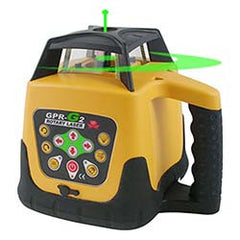
- Accuracy – Laser levels are more accurate than other tools such as the spirit levels.
- Manual vs Auto – Auto lasers, also known as self leveling lasers, essentially does most of it for you. Once it starts up it will eventually give you a true level line. It will also stop if disturbed, meaning you won’t get any inaccuracies. Manual lasers aren’t less accurate than auto lasers if they are set up properly. However, unlike auto lasers, if they are disturbed they will carry on running which is why they are better suited to smaller projects.
- Green Beam vs Red Beam – Green beam lasers are easier to see because they appear much brighter. They are only used for large scale, indoor projects where the line needs to be seen instead of using a laser level detector.
- Indoor or Outdoor Usage – Are you using your level for indoor or outdoor projects? There are different types of laser levels that could be better suited for it’s intended use.
2) Types of Laser Level
There are a variety of laser levels available, all with different qualities suited to specific needs. If you require a laser level for interior use you may need to use line laser or dot lasers which are better equipped for that type of usage.
Perhaps you will need a laser for exterior use, a rotary laser should be considered in this instance. Other types have more specific uses, such as pipe lasers. These are used for pipes and plumbing, whereas dumpy lasers are better suited to surveying.
One of the most used laser levels would be the rotary laser. This is because it is a more advanced and versatile laser that can be used for a variety of jobs ranging from exterior and interior usage.
Types of Laser levels include:
Rotary Lasers
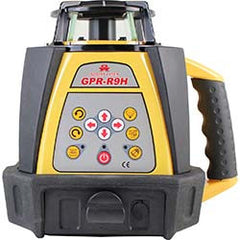
A rotary laser sends out a 360-degree spinning laser beam creating a highly accurate "chalk line" or leveling line from which to work.
This is very useful for a wide range of jobs including tiling, aligning and plumbing a wall, leveling floors, aligning kitchen units, any type of basic survey work, site layout, calculating grades and much more.
Once acquired, you will need to set up your rotary laser using the manual. The most beneficial way to set up the level will be using a tripod, so it is essential that you purchase a set or buy one separately.
Next you will need to turn the device on and begin leveling. It is ideal to purchase a self-leveling laser as you won’t need to calibrate the measurement – allowing you to get much more accurate measurements. Once this is complete you can begin measuring by pointing the laser where you need it to be.
Our recommended rotary lasers would be our GPR R95, which is a red beam laser, and GPR-G95, a green beam laser level. Both are extremely quick, automatic laser levels.
A bestselling rotary laser to also consider would be a TopCon RL H5A. Considered the best on the market with excellent features including up to 100 hours of battery life, an electronic horizontal self-leveling feature and much more. It is an expensive investment but will almost certainly save you money in the long run.
View Our Rotary Laser Levels »

Best Rotary Laser Level
Winner: GPR R95 Rotary Laser Level Kit
The GPR R95 Rotary Laser Level is a high-performance, low-cost rotary laser level.
A superb laser level package at a very reasonable price.
View the GPR R95 Laser Level »
Grade Lasers
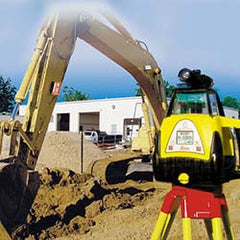
Grade lasers are accurate and reliable rotating lasers that can be used for applications that require precise grade. There are single and dual grade lasers available and so can be used wherever required.
These instruments perform a wide range of tasks including laying out a construction site, collecting height and angle data, aligning concrete forms or complete site preparation and earthworks.
The Leica Rugby Grade Lasers are automatic and self levelling for jobs of any size, large or small offering extra features such as axis alignment and long range remote control.
If buying outright is an issue, we also offer hire services.

Best Grade Laser Level
Winner: Leica Rugby CLH
Leica Rugby CLH (horizontal) simplicity allows for effortless use of the capabilities of the laser system.
The upgrade options allow for maximised performance in all levelling applications.
The upgrade option allows you to choose your grade capabilities making this The First Upgradable Laser Level.
Pipe Lasers
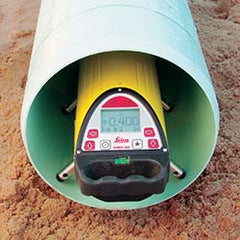
The clue is in the name, pipe lasers (also known as utility construction lasers) are used for work in pipes. This can be above the ground, in manholes or in the pipes themselves.
Our recommended pipe laser is the Leica Piper 100. Powerful and compact, the Leica Piper is the only pipe laser that fits inside a 100 mm (four inch) pipe. It is built with solid cast-aluminium housings, and is loaded with features that will improve productivity and minimize downtime on the job-site.

Best Pipe Laser Level
Winner: Leica Piper 100
Powerful and compact, the Leica Piper is the only pipe laser that fits inside a 100 mm (four inch) pipe.
Line Lasers
Line lasers allow the user to establish a horizontal or vertical plane by projecting a beam, or line, of light usually around 180 degrees horizontally and vertically. However, there are some line laser levels that can project a beam 360 degrees.
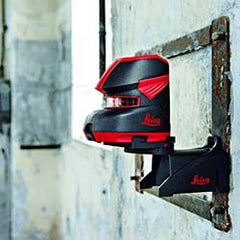
This device is particularly useful for anything needing horizontal or vertical leveling.
To use a line laser, you will need to set it up on the flattest/level surface available – tripods are the best way of achieving this. You can then make sure the laser is level, either manually or automatically, depending on whether you have a self leveling laser or not. The measuring and marking process can then begin and once you have your level line you can use it for reference.
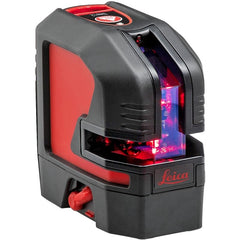
Best Line Laser Level
Winner: Leica Lino L2 Line Laser
The high-precision optics of the Leica Lino L2 ensure outstanding laser line visibility up to 25 metres, depending on lighting conditions..
Dot Lasers
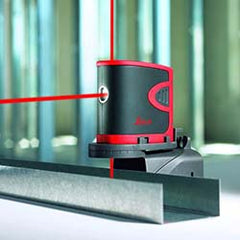
A Dot laser is very similar to a line laser but instead of projecting a line it produces a dot.
Usually these lasers will project a dot, or multiple, which will appear once the laser is level.
When showing multiple dots, they are seen at exactly the right angle to one another.

Best Dot Laser Level
Winner: Leica Lino P5
The Leica Lino P5 point laser is very easy to use. At the push of a button, it accurately projects five reference points at exact right angles to one another.
3) Laser Level Brands
Leica Laser Levels
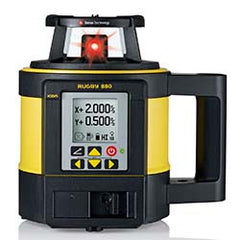
Leica Geosystems are market leaders in the production of high standard survey equipment. With almost 200 years’ experience in the art of capturing, analysing and displaying spatial information, Leica Geosystems have produced the most complete range of products; whatever your needs.
Laser Levels are a key component of the Leica Geosystems range of survey equipment.
Leveling, aligning and squaring are tasks that can be performed at previously unseen speeds whilst maintaining 100% accuracy; in all weather conditions.
Some top selling Lecia levels to consider include:
- The Leica Rugby 600 Laser Level Range is specifically designed to provide simplicity. It is fast, tough and highly accurate. A huge number of surveying tasks are possible with this range and they are proven to reduce errors and site downtime.
- The Leica Rugby 800 Laser Level Range is the toughest laser level on site. We recommend you view the video "Leica Rugby - The Toughest Laser Level On Site" It explains well the kind of treatment the 800 range can endure whilst still performing at 100% accuracy.
- The Leica Lino Range is an affordable range of line and dot lasers that are incredibly useful for internal use. Save time and money whilst eliminating mistakes!
TopCon Laser Levels
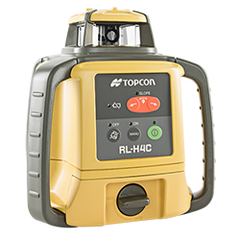
Another well-known market provider is TopCon. They supply and provide mature, feature rich and versatile tools that are easy to use.
Their lasers are highly refined and designed to assure you are getting the best and most accurate results.
A top laser levels to consider from top con would be the Topcon RL H5A, which combines three laser functionalities into one and is suitable for types of uses in different environments.
4) What Laser Level Accessories Will I Need?
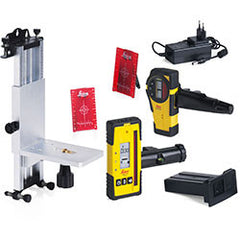
- Tripod – These are useful tools to have in the laser level world. It can help to provide a level flooring, making results more accurate.
- Laser Line Detector – These tools work alongside laser levels and can provide acoustic or optical signals that make it easier to find laser lines.
- Batteries – Strong rechargeable batteries are beneficial, especially if laser levels will be going onsite. Some batteries offer up to 2 days continuous operation.
- Chargers – Laser level batteries are rechargeable so it is essential to carry chargers to make sure you can use it on site.
- Remote Controls – This product will allow you to adjust settings such as rotational speed, auto leveling, manual leveling etc. remotely.
- Leveling Staff – Ranging from E-type, bar coded, standard invar & industrial invar, there are many leveling staffs to choose from to assist you with leveling. Our NEDO Fibreglass Leveling Staff is especially sturdy and durable and is ideal for leveling close to power lines and railways.
5) What is a Laser Level?
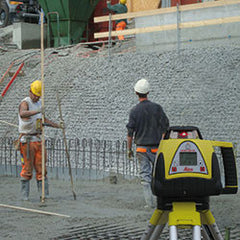
A laser level is a control tool used in surveying and construction. A laser beam projector can be fixed to a tripod which is then leveled according to the accuracy of the device. The device will project a fixed green or red beam along the horizontal or vertical axis. There a many different types of laser levels to consider when deciding to buy or hire. The most common levels are line and dot lasers, grade lasers and pipe lasers.
Laser levels can be used for several reasons and should be considered a much-needed instrument for home use as well as in different industries. Uses vary from indoor applications and outdoor applications.
6) Laser Level Applications
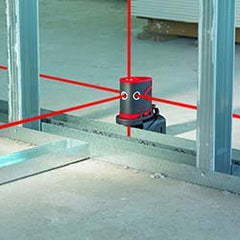
Some indoor application of Laser Levels include:
- Leveling floors
- Easily check the height of doors and windows
- Align shelves, cabinets, trim etc.
- Measuring distances between objects
Some outdoor applications of laser levels include:
- Basic surveying
- Site layout
- Check the elevation of land
- Plumbing
Laser levels were designed to speed up the setting up process in the workplace. Using this device is quick, easy and reliable. The accuracy over long distance is far more superior to that of a simple spirit level, which is suitable for shorter distances, but will give less accurate results for longer distance leveling.
These tools offer more functions such as plumbing and distance measuring, making it a multipurpose tool which saves money, saves room and is all around more convenient for the buyer.
7) Laser Levels: To Buy or Hire?
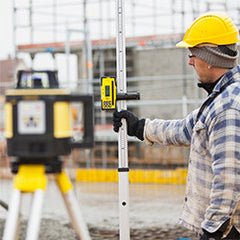
Deciding you want or need a laser level is the first step, next you will need to decide whether buying or hiring is best for you. It all depends on what you’ll be using the laser for and how often you will be using it.
Buying a laser level outright can be ideal for those customers who know they will be using it regularly, especially as some laser levels can be relatively inexpensive.
If you will only be using it on a limited basis for jobs it may be wise to consider hiring.
Read our Hiring vs Buying guide below for more information!
Contact Us
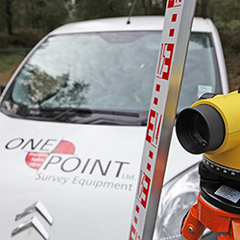
If you have any queries feel free to contact us.
One of our experienced team will be happy to help
Email: info@onepointsurvey.com
Phone: 0800 633 5131

